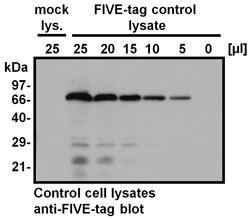navigation: home > Kontroll-Lysate > FIVE-tag Kontroll-Lysat
FIVE-tag control-lysate
Description
The FIVE-tag control-lysate was generated from
transfected HEK293 cells, expressing a FIVE-
tagged protein. The FIVE-tag corresponds to
a pentapeptide (PEYFK) of the Nef protein from
the HI virus and is one of the most compact
epitope-tags in use.
To generate the FIVE-tag control-lysate, HEK293
cells were transiently transfected with a mammalian
expression vector coding for a cytoplasmic
protein harbouring an amino-terminal FIVE-tag.
A whole cell lysate was prepared from these
transiently transfected cells. Besides all other
cellular proteins, this whole cell lysate contains the
FIVE-tag protein, which shows an apparent
molecular weight of ~70 kDa upon SDS-PAGE.
In addition to the FIVE-tag control-lysate, a
mock-lysate was prepared from HEK293 cells,
which were transfected with the empty
expression vector.
Product
Whole cell lysate:
50 µl
Cell line:
HEK293 cells
Tagged protein:
Human cytoplasmic protein
with an amino-terminal FIVE-tag.
MW:
~70 kDa
Lysis buffer:
60 mM Tris/HCL pH 6.8, 2% SDS,
5% mercaptoethanol,
50 µg/ml bromophenolblue, 10% glycerol
Application:
For SDS-PAGE/Western Blotting
15 µl of the lysates should be applied per
lane of a 15% polyacrylamide-gel.
Shipping and storage
Shipping:
The lysate is shipped in cold case.
Storage:
Lysate is stable for 1 week at 4°C.
For prolonged storage, the lysate should be
stored at -80°C. Aliquot to avoid repeated freezing
and thawing.
At -80°C, the product is stable for at least 1 year
from shipment.
Application in quality control

Western Blotting using the FIVE-tag control-lysate and the mock-lysate.
HEK293 cells were transiently transfected either
with the empty expression vector (mock-lysate;
mock-lys.) or with an expression vector
encompassing the cDNA of a FIVE-tag protein
(FIVE-tag control-lysate).
25 µl of the mock-lysate and the indicated amounts
of the FIVE-tag control-lysate (25, 20, 15, 10, 5,
or 0 µl) were separated by SDS-PAGE using
a 15% polyacrylamide-gel and then transfered onto
a PVDF membrane. The membrane was probed
with the monoclonal anti-FIVE-tag antibody from tag-tools (clone TT1; dilution 1:2,000).
The FIVE-tag bound primary antibody was
detected by incubation with HRP-coupled
protein G (dilution 1:10,000) and visualized using
chemiluminescence.
The X-ray film was exposed for 30 seconds.
Whereas a specific ~70 kDa band is detected
in the FIVE-tag control-lysate at all applied volumes
(5 - 25 µl), no binding of the anti-FIVE-tag antibody
to cellular proteins can be detected in the lane,
where 25 µl of the mock-lysate was applied.
At larger volumes of the FIVE-tag control-lysate
(20 and 25 µl), additional protein bands are detected,
which comprise degradation products of the
FIVE-tag protein.
Use
The FIVE-tag control-lysate and the mock-lysate
are for quality control in research applications only.
Not for diagnostic or therapeutic purpose.
![]()

